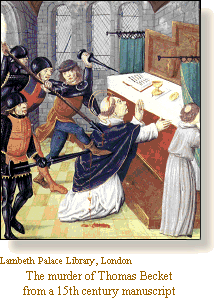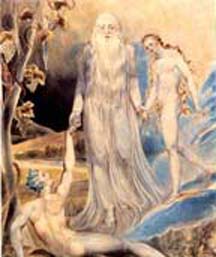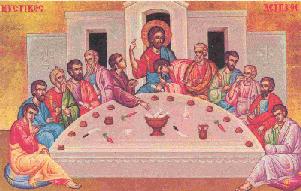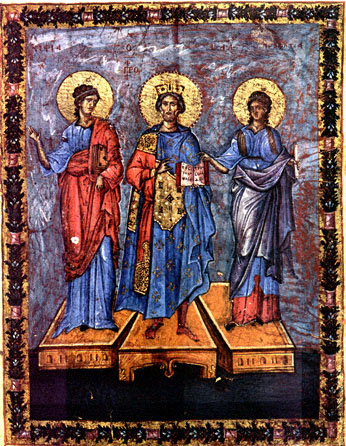Mary Suydam
![]() Department of Religion
Department of Religion
Mary Suydam
![]()
Mary Suydam Office: Ascension 309
Tues eve. Office Hours: T-Th 1-4
Ascension 120 PBX 5067
I. Course Description: In this course we will examine the importance and meanings of blood in the history of Christianity, and the extent to which blood in that tradition is perceived as gendered and/or enabling power. Although people in contemporary societies often view themselves as governed by a scientific perspective, religious ideas about blood often reflect much older conceptions. This seminar will explore the historical context and contemporary attitudes towards blood in Christianity. Topics to be considered include the idea of sacrifice, Jesus' redemptive blood, the Eucharist, and blood in the human body (both saintly and otherwise) and in religious places (sacred sites, altars). The seminar will explore the historical matrix from which Christianity arose and analyze Hellenistic Roman and Jewish concepts about blood and trace the origin of continuing as well as different attitudes towards blood in religion, as animal sacrifices ceased to be performed.
II. Readings:
Brown, Peter.The Body and Society. Columbia University Press.
Bynum, Caroline Walker. The Resurrection of the Body. Columbia University Press.
Douglas, Mary. Purity and Danger. Henry Holt Publishing.
Frankiel, Sandra. Christianity. Harper San Francisco.
Rubin, Miri. Corpus Christi: The Eucharist in Late Medieval Culture. Cambridge University Press.
Stevens, Maryanne, ed. Reconstructing the Christ Symbol: Essays in Feminist Christology. Paulist Press.
Other readings will be available on course reserve. We will also be searching for data in both print and non-print sources, including the World Wide Web.
III. Structure of the Course: This course will be structured as a seminar in which every member will be expected to contribute. There will be occasional brief presentations by the teacher. Class will focus on serious discussion and presentation of weekly assigned material. You should come to class each week prepared to discuss the reading for that week. You should also bring the relevant reading materials. Each class will begin with a problem-solving or analytical exercise related to the topic to be discussed in class. Then we will discuss the in-class exercise and the readings.
Because I will not be presenting formal lectures, you will have weekly fact-finding assignments to provide context for the topics covered. In other words, each of you has some responsibility for structuring the background for our discussions. You will be expected to turn in a brief (one to two pages) typed paper and to report on your findings to the class. Because of the nature of the topics I expect that we will all be making extensive use of Internet resources. You are not expected to possess terrific computer skills -- acquiring computer skills will be part of the learning experience of this class for both students and professor.
Because of the structure of this seminar, your attendance is mandatory. If, for any reason, you miss more than two classes, you will fail this class. It is also important to realize at the outset that we will be spending many hours in the computer lab outside of class, particularly the last two weeks of class. This is the equivalent of the time you would spend on a research paper or studying for midterms and finals.
IV. Fact-finding Assignments: These weekly assignments will require you to look up some information not provided in the readings. Remember: an important part of fact-finding is judging the source and quality of the information you find. You will also be required to take notes on any required course reserve readings and to periodically turn in these notes.
V. Class Project. As a class we will design a web site, linked to the Religious Studies web site devoted to the study of blood topics. No prior internet experience is necessary for this project. The site will consist of arranging, synthesizing, and making sense of the information we collect over the semester. Therefore, it is very important that we organize and collate this information during the course of the semester. This will be a group project.
VI. Grading: Seminar participation and in-class exercises: 25%
Fact-finding assignments and notes on reading: 25%
Class project: 50%
There will be no midterm or final examination for this course.
The goal of this seminar is to provide advanced students with the opportunity to engage in serious research in religious studies on a specialized topic. The production of a student web site is intended to provide a laboratory for learning religious studies research skills including:

1) how to differentiate religious and academic discussions of religious topics
2) how to work in a collaborative setting
3) how to generate hypotheses, test them, and rework them over a period of time
4) how to edit and re-write (many times!) one's work
5) how to accept academic criticism, both as a recipient and as a producer
6. as a cross-listed course in WMNS, how to think interdisciplinarily.
These skills will help prepare interested students for graduate study.
VII. Outline of Topics: (subject to revision due to interest of class members)
Week 1: August 29: Introduction to the course; searching the web.
Please read Douglas, chapter 1, and Barbara Ehrenreich, Blood Rites, chapters 1 and 2, prior to class.
Reading for next week: Frankiel, Christianity, chapters 1 and 2
The gospel of Mark
Find out about: the WMNS and Religion Blood web sites; Judaism; mystery religions, Roman culture.
Week 2: Sept. 5: Christianity: Origins. Introduction to HTML.
Reading
for next week: Paul's Letter to the Romans, chapters 1-8
Paul's Letter to the Corinthians, chapters 11-12, 15
Brown, Body and Society, chapters 1 and 2
Find out about: Christian ideas of sacrifice, redemption, and the mystical body
Week 3: Sept. 12: Christianity: the early church
Reading for next week: Brown, Body and Society, chapters 3-5
Douglas, Purity and Danger, chapters 2 and 6
Find out about: Gnosticism
Week 4: September 19: Gnostic Christianity: Body and Blood
Reading for next week: Brown, Body and Society, chapters 17-19
Frankiel, Christianity, Chapter 3
Find out about: Martyrs and shrines
Week 5: September 26: Augustine and the development of a sacramental theology
 Reading
for next week: Rubin, Corpus Christi, chapters 1-2
Reading
for next week: Rubin, Corpus Christi, chapters 1-2
Ehrenreich, Blood Rites, chapter 4 (on reserve)
Find out about: Contemporary views of Christian sacraments
Week 6: October 3: The Eucharist
Reading for next October 17: Bynum, The Resurrection of the Body
Find out about: the afterlife; views about death
We will schedule lab times for the following week since there will be no class. Begin to design web site.
Week 8: October 17: Death and The Afterlife
Reading for next week: Brown, Body and Society, chapters 11-13
Douglas, Purity and Danger, chapter 7
Find out about: Saints, sexuality and sainthood, bleeding saints

Week 9: October 24: Saints
Reading for next week: Brown, Body and Society, chapters 14-16
Mary Daly, GynEcology (selections)
Find out about: feminist and other views on the church and marriage; a married female and male saint (each)
Week 10: October 31: Marriage and sexuality
Reading for next week: Maryanne Stevens, Reconstructing the Christ Symbol
Rubin, Corpus Christi, chapter 5
Week 11: November 7: Gender and the Christ symbol
Organization of web site.

Reading for next week: Frankiel, Christianity, chapter 4
Jonathan Z. Smith, To Take Place (Course reserve)
Find out about: Pilgrimages, the Stations of the Cross
Week 12: November 14: Christianity and Time
Week 13: November 28: Open topic
Week 14: December 5: Open topic
WEB SITE MUST BE FINISHED BY DECEMBER 12